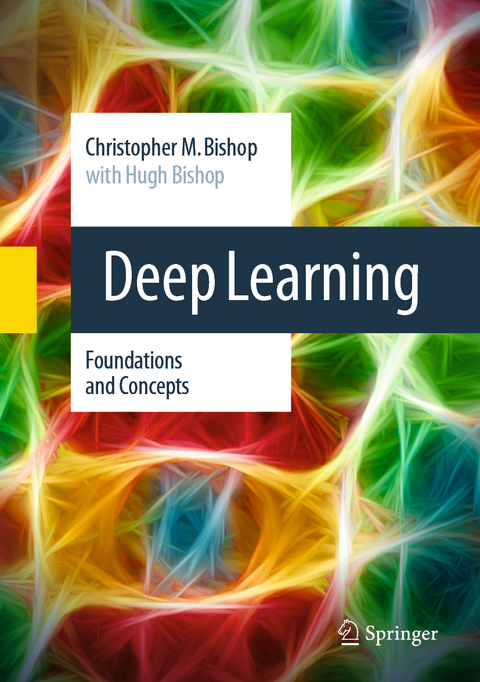
Deep Learning
Springer International Publishing (Verlag)
978-3-031-45467-7 (ISBN)
This book offers a comprehensive introduction to the central ideas that underpin deep learning. It is intended both for newcomers to machine learning and for those already experienced in the field. Covering key concepts relating to contemporary architectures and techniques, this essential book equips readers with a robust foundation for potential future specialization. The field of deep learning is undergoing rapid evolution, and therefore this book focusses on ideas that are likely to endure the test of time.
The book is organized into numerous bite-sized chapters, each exploring a distinct topic, and the narrative follows a linear progression, with each chapter building upon content from its predecessors. This structure is well-suited to teaching a two-semester undergraduate or postgraduate machine learning course, while remaining equally relevant to those engaged in active research or in self-study.
A full understanding of machine learning requires some mathematical background and so the book includes a self-contained introduction to probability theory. However, the focus of the book is on conveying a clear understanding of ideas, with emphasis on the real-world practical value of techniques rather than on abstract theory. Complex concepts are therefore presented from multiple complementary perspectives including textual descriptions, diagrams, mathematical formulae, and pseudo-code.
Chris Bishop is a Technical Fellow at Microsoft and is the Director of Microsoft Research AI4Science. He is a Fellow of Darwin College Cambridge, a Fellow of the Royal Academy of Engineering, and a Fellow of the Royal Society.
Hugh Bishop is an Applied Scientist at Wayve, a deep learning autonomous driving company in London, where he designs and trains deep neural networks. He completed his MPhil in Machine Learning and Machine Intelligence at Cambridge University.
"Chris Bishop wrote a terrific textbook on neural networks in 1995 and has a deep knowledge of the field and its core ideas. His many years of experience in explaining neural networks have made him extremely skillful at presenting complicated ideas in the simplest possible way and it is a delight to see these skills applied to the revolutionary new developments in the field." -- Geoffrey Hinton
"With the recent explosion of deep learning and AI as a research topic, and the quickly growing importance of AI applications, a modern textbook on the topic was badly needed. The "New Bishop" masterfully fills the gap, covering algorithms for supervised and unsupervised learning, modern deep learning architecture families, as well as how to apply all of this to various application areas." - Yann LeCun
"This excellent and very educational book will bring the reader up to date with the main concepts and advances in deep learning with a solid anchoring in probability. Theseconcepts are powering current industrial AI systems and are likely to form the basis of further advances towards artificial general intelligence." -- Yoshua Bengio
lt;b>Chris Bishop is a Technical Fellow at Microsoft and is Lab Director of Microsoft Research Cambridge, UK. He is also Professor of Computer Science at the University of Edinburgh, and a Fellow of Darwin College, Cambridge. In 2004, he was elected Fellow of the Royal Academy of Engineering, in 2007 he was elected Fellow of the Royal Society of Edinburgh, and in 2017 he was elected Fellow of the Royal Society. He is a keen advocate of public engagement in science, and in 2008 he delivered the prestigious Royal Institution Christmas Lectures, established in 1825 by Michael Faraday, and broadcast on national television. Chris is a member of the UK AI Council, and was also recently appointed to the Prime Minister's Council for Science and Technology.
Hugh Bishop graduated with First Class Honours in Computer Science from Durham and is now studying the MPhil in Machine Learning at Cambridge University. This is the UK's top master's program in machine learning and is highly selective, with just 27 students chosen from more than 600 applicants. Hugh has done internships at the UK startup FiveAI, working on dynamic object detection for autonomous vehicles using TensorFlow, and at Microsoft Research working on reinforcement learning for agents in Minecraft. He also spent two months working at Cambridge University helping to prepare an online textbook on inference and machine learning using Jupyter Notebooks for use on the MPhil in Machine Learning.
Preface.- The Deep Learning Revolution.- Probabilities.- Standard Distributions.- Single-layer Networks: Regression.- Single-layer Networks: Classification.- Deep Neural Networks.- Gradient Descent.- Backpropagation.- Regularization.- Convolutional Networks.- Structured Distributions.- Transformers.- Graph Neural Networks.- Sampling.- Discrete Latent Variables.- Continuous Latent Variables.- Generative Adversarial Networks.- Normalizing Flows.- Autoencoders.- Diffusion Models.- Appendix A Linear Algebra.- Appendix B Calculus of Variations.- Appendix C Lagrange Multipliers.- Biblyography.- Index
| Erscheinungsdatum | 02.11.2023 |
|---|---|
| Zusatzinfo | XX, 649 p. 600 illus., 400 illus. in color. |
| Verlagsort | Cham |
| Sprache | englisch |
| Maße | 178 x 254 mm |
| Gewicht | 1444 g |
| Themenwelt | Mathematik / Informatik ► Informatik ► Datenbanken |
| Informatik ► Theorie / Studium ► Künstliche Intelligenz / Robotik | |
| Schlagworte | convolutional networks • Decision Theory • Deep learning • Directed graphical models • machine learning • Neural networks |
| ISBN-10 | 3-031-45467-7 / 3031454677 |
| ISBN-13 | 978-3-031-45467-7 / 9783031454677 |
| Zustand | Neuware |
| Informationen gemäß Produktsicherheitsverordnung (GPSR) | |
| Haben Sie eine Frage zum Produkt? |
aus dem Bereich


